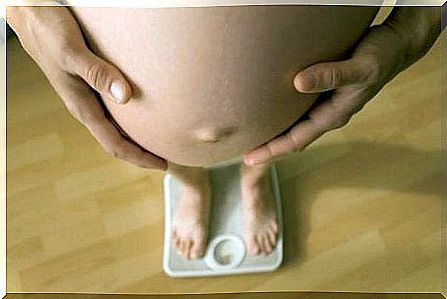Pregnancy And Large Fetus

In this article, we will discuss the topic of pregnancy and the large size of the fetus. The fetus is said to be large when the baby arrives in the world, weighing over 4,500 grams.
In addition to the fact that a large fetus complicates childbirth, this trait may cause the development of some health problems. So what should a woman carrying a large fetus do?
To avoid major complications, many mothers wonder what she can do in advance to prevent problems that could potentially cause fetal size.
The weight of a large fetus – over 4.5 pounds – is higher than the weight of a normal fetus. 2.4% of children born in Finland in 2017 weighed more than 4.5 kilograms.
Large fetus – what causes this trait?
Before we talk about the procedures for a large fetus, it is good to know more about the subject. The following is a list of factors that can potentially cause large fetuses:
- Inheritance : If parents are prone to being overweight, the child is also more likely to inherit these susceptible genes for themselves. Thus, this may appear even before the birth of the child.
- Maternal weight: If the mother is overweight during pregnancy, it may also affect the weight of the fetus.
- Gestational diabetes : Because diabetes causes hormonal imbalances, it can lead to excessive sugar levels in the fetus. This causes the fetus to gain weight.
- Pregnancy: Once the pregnancy has progressed to the 40th week of pregnancy, the fetus may have grown too large.
- Previous pregnancies: If this is not the mother’s first pregnancy, the pathways that feed the fetus may be wider, resulting in large fetal size.

Other factors that affect fetal size include the mother’s age, diet, socioeconomic conditions, and the child’s possible genetic diseases. Of the genetic diseases, for example, Weaver syndrome, Sotos syndrome, and other hereditary diseases can be the cause of large fetal size.
Possible consequences
It is entirely possible that a large fetus will be born quite normally. However, there is a real risk of complications during childbirth, as well as health problems as the baby grows.
In the case of a large baby, an obstetric injury, i.e., a postpartum injury, such as a dislocated shoulder or shoulder nerve plexus injury, is possible. The baby’s shoulder can go out of place if the shoulder gets stuck in the birth canal. In order for the child to be detached from the mother’s pelvis and to be born, a small fracture may have to be caused in her humerus.
The mother may also suffer from lesions such as heavy bleeding, complications in the administration of the anesthetic, and inflammation of the surrounding organs during childbirth.
In the future, the child may suffer from the following diseases:
- Diabetes
- Respiratory problems caused by underdeveloped lungs
- Polycythemia, or excessive red blood cell count
The risk of miscarriage during pregnancy is also higher in the case of a large fetus. This can be caused by e.g. uterine insufficiency or umbilical cord pressure. One reason for a miscarriage may be that the fetus does not get the nutrients it needs to develop properly.

The baby is big, but the calculated time is not yet – what to do?
Once your doctor has determined that your fetus is large, you can do little but prepare for a future birth.
However, because the factors that cause a large fetus are known, there are certain recommendations that should be followed with a view to future pregnancies.
The most important task is to monitor your own as well as your baby’s weight gain during pregnancy. You should also monitor your glucose levels as this may prevent or detect diabetes during pregnancy.
If the large size of the baby is due to an overweight pregnancy, your doctor may then recommend starting the delivery.
When it is time to give birth, your doctor may suggest a section if it is possible. In this way, both the mother and the child can avoid any complications that may occur during the birth.









